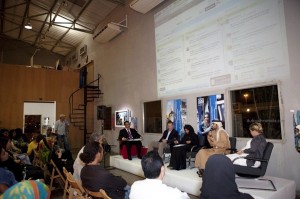Discussion Hosted by SAE Institute Dubai Debates future of Middle East Media Landscape
 According to a panel of local and international digital media experts, the Middle East is currently undergoing a new media explosion, and journalists must keep up with the times in order to remain relevant.
According to a panel of local and international digital media experts, the Middle East is currently undergoing a new media explosion, and journalists must keep up with the times in order to remain relevant.
The expert panel came together at the Shelter in Dubai this week to debate the future of the region’s media landscape and the fate of traditional media. Led by American author, online publisher and journalist Mark Briggs, the debate concluded that the region’s journalists must embrace new technology to excel in the digital age.
“The rise of new media doesn’t mean that Journalism is dying, it is just changing. Technology makes journalism better – it has already and the best is still ahead of us,†commented Briggs during the debate.
“There will still be a place for print newspapers but it will be with a thriving online and web element. Nowadays it is an online world, and that is where the battle will be won or lost,†he continued.
“A lot of print journalists who I have worked with in the past have feared the rise of technology but in reality it makes journalism more collaborative, more immediate and more interactive – better serving readers. Online allows journalists to reach far more people than you ever could through print,†Briggs added.
Underlining the importance and potential of digital journalism in the region, the panel marked the launch of the SAE Institute’s Diploma in Digital Journalism – the first course of its kind in the region.
Pia Heikkila, co-creator of the new SAE Institute Digital Journalism Diploma and a freelance digital journalist, commented: “Digital journalism is the way of the future. The media revolution shows no signs of slowing down, so journalists must evolve, embracing new forums and ways of working to reach their audiences.â€
“With the demand for new media on the rise and the industry set to expand considerably, courses such as the SAE Institute Diploma in Digital Journalism are vital to train students on the new tools and techniques required of modern journalists. The new course teaches students the values of journalism and how to tailor that to a range of media – it teaches you to think creatively.â€
The panel was moderated by Reg Athwal, Co-Founder and Chairman of online television platform onetvo.com, while supporting the debate were Nabila Usman, writer, journalist and business development executive for Newzglobe.com, an online news portal; and author and media personality Ali Al Saloom, writer of the popular ‘Ask Ali’ column.
At the close of the evening, the panelists gave their insights on where digital journalism will be in 10 years time:
“It will be an exciting marketplace, full of new business models and surprising examples of new media and digital journalism, with many success stories. The companies that fail to innovate will be left behind,†commented Briggs.
“Digital journalism is in its infancy, but has unlimited potential. If the old dinosaurs don’t embrace the new world, they will die. The new world is already here. We need to change the way we think,†added Heikkila.
Enrolments for the new SAE Digital Journalism Diploma are open now and the first classes begin on June 27th 2010. The 12 month, full time Diploma was developed in collaboration with media professionals in order to develop industry-ready graduates willing to undertake the new challenges of an ever-changing journalism world.





































